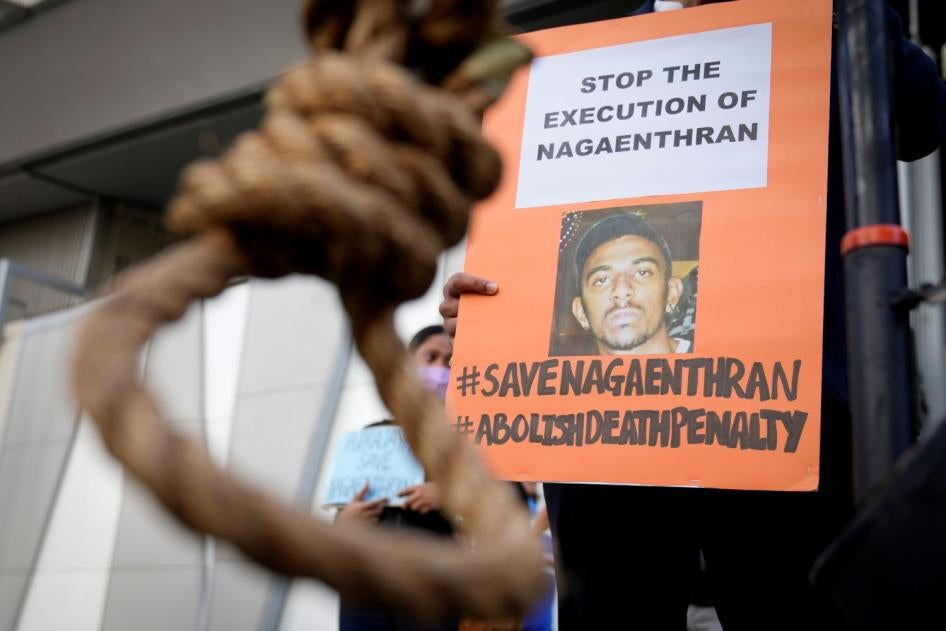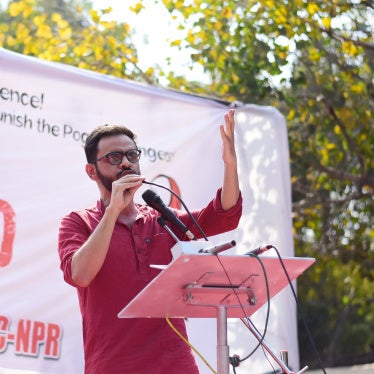(Jakarta) – Singapore’s government resumed executions and pressured activists and lawyers handling death row cases in 2022, Human Rights Watch said today in its World Report 2023. The government also repressed rights to free expression and peaceful assembly and arrested people attempting to exercise those rights.
“Singapore authorities emerged from the Covid-19 pandemic and went on an execution spree, putting to death at least 11 people in 2022,” said Phil Robertson, deputy Asia director at Human Rights Watch. “Activists and lawyers faced systematic harassment and even arrest and imprisonment for speaking out against capital punishment and other issues.”
In the 712-page World Report 2023, its 33rd edition, Human Rights Watch reviews human rights practices in close to 100 countries. In her introductory essay, acting Executive Director Tirana Hassan says that in a world in which power has shifted, it is no longer possible to rely on a small group of mostly Global North governments to defend human rights. The world’s mobilization around Russia’s war in Ukraine reminds us of the extraordinary potential when governments realize their human rights obligations on a global scale. The responsibility is on individual countries, big and small, to apply a human rights framework to their policies, and then work together to protect and promote human rights.
After a two-year hiatus during the Covid-19 pandemic, the authorities resumed executions, all for nonviolent drug offenses. Among those executed was Nagaenthran Dharmalingam, a 33-year-old Malaysian national with an intellectual disability.
Singapore authorities harassed lawyers and activists working to support defendants and their families, raise awareness of alleged racial bias on death row, and challenge the government’s claim that the death penalty deters drug trafficking. On August 3, Singapore’s high court struck down a lawsuit filed by 24 death row inmates alleging that the authorities obstructed their access to legal counsel.
The Singapore government used restrictive public order laws, threats of defamation suits, and contempt of court actions against activists and media outlets critical of the government. In September, the activist Jolovan Wham was jailed for 15 days for a one-person “illegal assembly” for holding up a piece of paper outside the state courts calling for dropping charges against The Online Citizen Editor Terry Xu and Contributor Daniel De Costa.
In June, the police called in two activists for questioning, Kirsten Han and Rocky Howe, for a four-person vigil outside Changi Prison in March and a photograph taken outside the prison in April.
On November 29, the Singapore parliament voted to repeal section 377A of the criminal code, a colonial-era law that criminalizes sexual relations between men. However, that day, parliament passed a constitutional amendment entrenching a legal definition of “marriage” as being between a man and a woman, effectively blocking any legal challenges relating to the definition of marriage.
Foreign migrant workers in Singapore are generally required to live in crowded and unsanitary dormitories. Regulations since June 2020 requiring migrant workers to obtain an “exit pass” from their employer to leave their dormitory were lifted in June. Under the new policy, though, they are still required to apply for a “visit pass” to go to four popular locations in Singapore on Sundays or public holidays.
In June, the Singapore government denied a work permit renewal for a migrant worker advocate, Zakir Hossain Khokan, on the grounds that his October 2021 Facebook post about the treatment of migrant workers was “false.”









